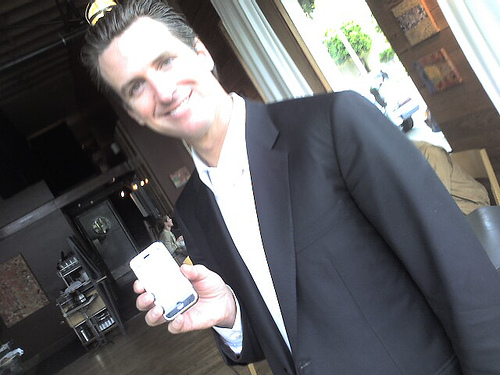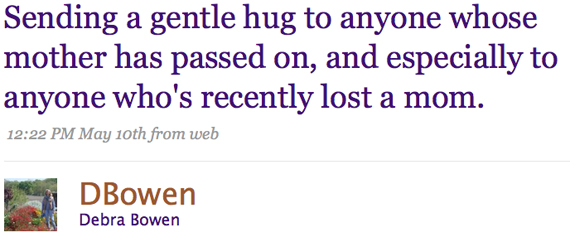The conclusion of our three part series, see parts one and two.
What few of these eager and ambitious men and women angling for higher office or their coteries of public and private aides have acknowledged are the real and current, or potential and future problems arising from new social media tools: ethical improprieties, interest conflicts and propaganda abuses are obvious consequences in theory and practice. Social networks and Web publishing make monitoring the majority’s public sentiment and mollifying it with a mouthful of rhetoric easier and more politically expedient than ever. “My job, and the job of all good journalists I think, is to put that message in context,” the Chronicle‘s Audrey Cooper remarked when asked about statements and press releases issued by public officials.
Almost anybody who’s posted a significant quantity of text, photos or video online for an extended period of time has regretted at least one public revelation, and might have even deleted the embarrassing item from the public record (or at least used a Web site’s privacy tools to restrict access). Even then, deletions and access restrictions aren’t reliable, as search engines and other Web sites may keep copies which may remain publicly available, and motivated snoops can find ways around privacy barriers.
Elected officials are the very definition of public figures who’ve chosen to sacrifice their right to privacy. Obliged to serve the public openly and honestly, though constantly encountering opportunities for corruption through personal ambition and political gain, their choices between keeping private secrets or telling public truths (and lies) pits their individual interests against those of their constituents.
Shortly after the Cosco Busan freighter sprang a leak, spilling toxic fuel into San Francisco Bay, Mayor Newsom left on a planned vacation to Hawaii, assuring residents that he was in constant contact with local officials dealing with the environmental catastrophe. Yet after returning from his trip, Newsom refused to provide details of messages he sent or received while away — citing the use of a personal iPhone as reason enough deny access to records of any communication between himself and other public servants.

Presumably, the mayor updates his Twitter account from the same iPhone, or better yet, a newer model. But by using a personal device, he can not only avoid public disclosure statues by “co-mingles” both public and private business — also avoiding laws against using publicly funded facilities for political ends like soliciting donations and campaign support.
By the same logic, using privately owned Web sites like Twitter, Facebook and YouTube, politicians can also ignore record keeping and public disclosure statutes while indulging in public business or personal promotion as they see fit. It allows the mayor to add “favorites” from his MayorGavinNewsom account to appear as thumbnails on his NewsomforCalifornia account, co-mingling purported city business with promotional efforts such as his campaign kickoff ad.
“The strategy of what they’re doing is have as little as possible go on their Web site,” explained online political strategy consultant Bob Brigham. Brigham is another Twitter user who was blocked from by Newsom’s account. “It was petty,” he said of the snub. Yet he defended the mayor’s use of the account for both personal publicity and public engagement.
“Some people would tell you there’s sketchy ethical issues, but I don’t believe [that to be the case],” he explained. For folks who ask simple, concise questions about city services, he felt the mayor was within his rights to answer as a sort of 311 operator by proxy. “Even though it is his personal account, with the way the world works, I think it makes sense if somebody asks ‘How do I get rid of my mattress?’ for him to point out large item disposal.” As an example, Brigham lauded California Secretary of State Deborah Bowen as “The best person in California politics of electeds on Twitter.”

Bowen’s Twitter stream is certainly personal, and the tone is certainly a familiar one for typical Twitter users. The updates on meeting schedules posted to the San Francisco Board of Supervisors account, with its strictly business mien, is tragically unendearing by comparison. But with Newsom, Brown and Villaraigosa, while it’s clear that the Twitter and Facebook updates serve their personal interest (namely, to woo voters in the hopes of getting elected), it’s not so clear that they are publishing updates themselves.
It’s not uncommon for celebrities and other busy people to hire someone as a ghost writer to manage their online media presence. Both Newsom and Villaraigosa occasionally make spelling or grammatical errors, which would be unlikely if written by an underling anxious about making a mistake. Yet Brown has help managing his LinkedIn account, some of Villaraigosa’s updates are signed DL by an aide named Daniel, and early updates on Newsom’s Twitter account were written in the third person.
The latter were probably handled by Deputy Communications Director Brian Purchia, who’s widely credited with maintaining Newsom’s Facebook profile and though working for the mayor’s office, describes himself as working in the “Online Media industry” on LinkedIn. And he probably has help in the form of interns who were solicited on Newsom’s Facebook profile. If not Purchia, certainly one of the nearly dozen staffers on the city payroll who work in the mayor’s office of communications are tracking activity and likely helping to keep all of Newsom’s accounts current.
So to some degree tools like Twitter, Facebook and YouTube are being used to directly address voter questions and concerns, and also offer a little insight into the lives of our elected officials. But policies on disclosure and accreditation vary widely, and while it’s one way to reach a certain segment of constituents, many more are left out. And whatever public value it offers for conducting public business has generally proven minimal compared to the personal value for politicians chasing publicity, donor contributions and votes on election day.
The reporting on this three part series was funded by Spot.us, an open source project, to pioneer “community funded reporting.”









